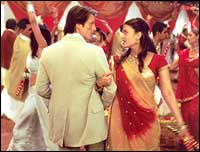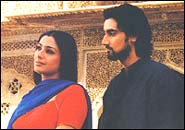 From the glitzy world of Bride And Prejudice to the hell of Matrubhoomi, where the shortage of women in a village leads to five men marrying one woman, the five-day South Asian International Film Festival offers films, documentaries and experimental shorts on a scale like never before in North America.
From the glitzy world of Bride And Prejudice to the hell of Matrubhoomi, where the shortage of women in a village leads to five men marrying one woman, the five-day South Asian International Film Festival offers films, documentaries and experimental shorts on a scale like never before in North America.
Presented by the South Asian Networking Association, SAIFF kicks off December 1 with Bride And Prejudice and will show New York about 40 films.
Presented by the South Asian Networking Association (SANA), the festival which kicks off with Bride And Prejudice includes big-budget Bollywood as well as self-funded documentaries.
There are movies that will bring a smile. And then there are polemical films and documentaries that could scare, disturb, and even provide activists with inspiration.
"SAIFF will give audiences of all ages and ethnicities the chance to discover new South Asian voices, celebrate established ones, and perhaps even get the inspiration to make their own on film," said Shilen Amin, founder of SAIFF and SANA.
| |||||||||||
The
The directors showcased include veterans such as Gautam Ghose (Impermanence) and first-timers such as Manish Jha (Matrubhoomi). Subjects range from the politics of communal hate (Final Solution) to the peace message of the Dalai Lama, and from the Maoist insurgency in India to the complicated civil war in Sri Lanka.
Some selections on the top-shelf roster are Nasreen Kabir's The Inner Life Of Shah Rukh Khan, a documentary on Bollywood's biggest star; Shwaas, India's 2004 Oscar entry; Nepal's Starkiss: Circus Girls Of India; Bangladesh's political drama, The Clay Bird; and the romantic Ye Dil Aapka Hua from Pakistan.
The films are being screened at the Chelsea Clearview West Theater and the newly opened Rubin Museum of Art, which has a South Asian theme.
"The films showcased include critically acclaimed features from the subcontinent and a powerful and explosive documentary section highlighting the volatile and dynamic nature of the region," said Suri Gopalan, director of programming.
Soman Chainani, managing director of the festival, said, "When we began thinking about what kind of South Asian entertainment events were missing in New York City and what kind of quality entertainment was lacking, we immediately thought of a film festival. Even though we have such a large South Asian community in New York, we have never had a film festival that brings together all the spheres of South Asian cinema -- or a festival with the scope that such an enterprise deserves.
 "We see SAIFF as a groundbreaking, explosive new entertainment event in New York City that will bring South Asians and non-South Asians together in celebration of our region's cinema," he added. "As SAIFF grows larger, I think you will see the festival cross over into the mainstream, where it becomes one of the mainstays on the New York City entertainment landscape."
"We see SAIFF as a groundbreaking, explosive new entertainment event in New York City that will bring South Asians and non-South Asians together in celebration of our region's cinema," he added. "As SAIFF grows larger, I think you will see the festival cross over into the mainstream, where it becomes one of the mainstays on the New York City entertainment landscape."
The festival also offers films like M F Husain's Meenaxi. The Taboo starrer with stunning visuals and a layered, Kaufman-esque plot flopped in India.





